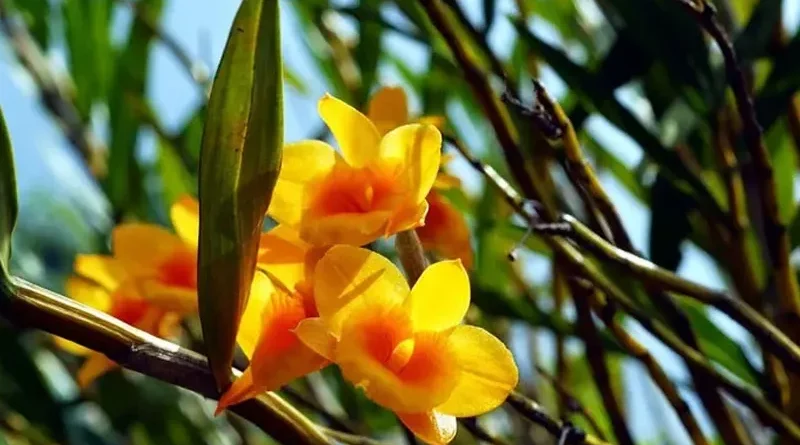Climate change triggers extinction of indigenous ‘God Flower’ in Taiwan
The Dendrobium orchid or golden grass orchid, known as the “God Flower” among the indigenous Tsou people in the mountains of Alishan, Taiwan, has been pushed to the verge of extinction by ever-worsening impacts of climate change.
The flower is believed to be a gateway to the gods by the Tsou people.
“My tribe has to have the God Flower for our ceremonies. Otherwise, God won’t be able to find us,” says tribal elder Gao Desheng.
Once abundantly found outside Tsou homes, the search for the God Flower now demands a venture deeper into the mountainous forests and even scaling trees, the BBC reported.
The Tsou blame climate change for the scarce availability of the God Flower.
Buds of this flower to bloom in spring require cold temperatures below 12°C. Typically flowers grow in warm temperate climates, at altitudes of 800 to 1,800m.
The environmental group, Greenpeace predicts that minimum temperatures in autumn and winter have increased over the past decade, leading to an average November temperature rise from 12-14°C to 14-16°C by 2050 due to global warming.
Taiwan is experiencing frequent droughts, warmer weather, and typhoons which are also a vital source of water for the tribe.
Recently, their failure to landfall has led to crop failure, impacting the Tsou rituals and livelihoods, and causing significant damage to the island’s water supply.
Meanwhile, the Tsou people have no solution for the vanishing God Flower, and Gao believes there is no substitute for it in their rituals.
The Tsou people’s war god Iafafeoi is believed to ensure the safe return of young people from the battlefield.
“It is said that the God Flower surrounds the habitat of this deity,” A Xiao-Ming, who is in his 40s, explained. “These flowers are placed on the roofs of Kuba (ceremonial centre for the village), signifying the presence of the divine.”
According to ancient tradition, the God Flower cannot be cultivated artificially. It must be found and picked in the wild before sunrise in the early morning before important ceremonies can begin.
The Tsou tribe, one of 16 Taiwanese indigenous tribes, number around 6,000 out of 23 million and primarily reside in the Alishan mountains.
Gao also expressed concern about his tribe’s future which he says depends on government support.
Despite a presidential campaign underway, he believes politicians are not adequately addressing the significant impact of climate change on Tsou’s way of life.
Greenpeace criticised the presidential candidates, calling them “climate snails” as the renewable energy goals they proposed are insufficient to achieve net-zero emissions, despite climate change being a significant concern for voters.

